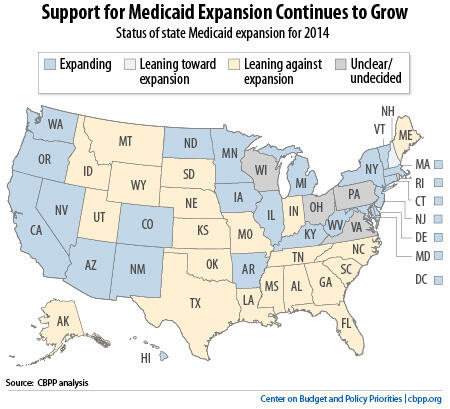BEYOND THE NUMBERS
“Coverage Gap” Could Narrow as More States Look to Expand Medicaid Under Health Reform
With 25 states already expanding Medicaid to low-income adults under health reform, governors in New Hampshire and Ohio want their states to expand their programs as well, which would extend coverage hundreds of thousands of currently uninsured adults, according to state estimates.
Last year’s Supreme Court decision upholding health reform gave states the choice of whether to implement the Medicaid expansion — which allows states to extend coverage to adults below 133 percent of the federal poverty line in 2014. Expanding Medicaid is a very good financial deal for states. The federal government will pick up 100 percent of the cost of the expansion to newly eligible individuals for the first three years and no less than 90 percent of the cost on a permanent basis.
In New Hampshire, a bipartisan panel endorsed a proposal to expand Medicaid last week. Governor Maggie Hassan has called a special session of the legislature in November to vote on the plan, which would cover as many as 50,000 adults in the state. And in a potentially promising move for 275,000 Ohioans, Governor John Kasich is appealing to a state legislative panel to vote today to approve the expansion there.

These moves would help reduce the so-called “coverage gap” into which more than 5 million Americans may fall, because their incomes are below the thresholds to qualify for premium subsidies to help buy health insurance through the new marketplaces, their incomes are too high for the existing Medicaid programs, and they live in states that aren’t planning to adopt the Medicaid expansion.
Moreover, expansion would make good financial sense for New Hampshire and Ohio. In the 25 states that have decided to expand Medicaid, a recent Kaiser Commission on Medicaid and the Uninsured’s survey showed that state spending on Medicaid will grow by 4.4 percent in 2014 — compared with 6.1 percent for the states that are not moving forward with expansion.
